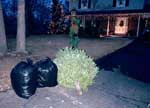There's More than One Way to Recycle a Christmas Tree

by Audrey Y. Scharmen
At a recent holiday party, a group of women were discussing some really deep subjects - all that intellectual stuff that women love to share with one another. This time the topic was what happens to old Christmas trees left on city lots or streets after the big day.
Now, the trees are probably all sent to recycling centers, but in my time (way back there someplace) they were put out, like old dogs, to wander the streets in packs until Easter when they simply disintegrated.
Actually, my mother told me when I was about seven, that they often were seen after dark as hairless changelings following disobedient children who refused to come home on time for supper. (I still peer over my shoulder when I am out late during their time abroad.)
The women's discussion grew quite intense at that gathering, before the topic switched from the fate of holiday trees to that of Halloween pumpkins. But that is another story.
That very night at three o'clock - the hour when great plots are born to writers - I recalled a tale of abandoned Christmas trees and what befell them in a small community long ago.
I am one who has always loved trees. I grew up with wonderful singing cottonwoods, enormous hemlocks with little caves beneath the spreading branches, weeping willows and forests of pine. They were important to me, yet I took their presence for granted. Then, suddenly, when I was grown and the mother of three young children, the man of our house suddenly transported us to an isolated air base in the Southwestern United States where no trees grew.
We arrived shortly before Christmas, when the stark flat moonscape at the edge of the Chihuahuan desert was already bleak with winter. No snow would fall there on that arid plain, I was told. There would be no white-frosted pines and ebony branches dipped in silver. Rocks and thorny shrubs and a single crooked sapling maple were all that grew in our new yard.
Right after the holiday, the father/husband left for temporary "hardship" duty in some exotic place where lush tropical things grew. He would return in three months, said he, and the children and I (even the dog) fell deep into depression.
Colored lights were gone from the windows of the community and the trees, stripped of finery, thrown into the drab yards to roll restlessly about and cling to the curbings with a band of tumbleweeds. I stared hard at them and realized there was a way to make us all happy - and restore some dignity to the homeless trees, as well.
So we spent that day with the bitter wind, gathering up the trees. As I dug holes in the concrete-like dirt of the back yard, the children staggered home with firs of all sizes. Some trees were bedraggled and bald, some trailed mangled tinsel, but most were still fresh and green as the forests of home.
We planted them in a sheltered spot away from the bully wind, and at day's end there stood a mini-forest proud and tall outside the window. It remained through Twelfth Night and on to Candlemas. Until spring arrived faithfully - just as it always has - everywhere.
Copyright 2000
Bay Weekly
|